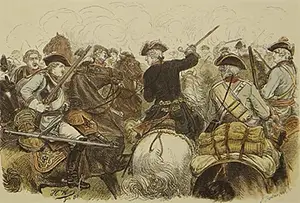Frederick the Great: Prussia's Shining Star
Part 1: Born to Fight and Rule Frederick the Great was King of Prussia for nearly five decades in the 18th Century. He was one of the most famous people in Europe during that time. 
He was born on Jan. 24, 1712, in Berlin. His father was the reigning King in Prussia and Elector of Brandenburg, Frederick William I, and his mother was Sophia Dorothea of Hanover. As the firstborn son, Frederick was the king-in-waiting. When the boy was just 6, his father, who wanted a natural born soldier as an heir apparent, ordered him to start military drills with a bunch of other children. Frederick endured the commands but was much more at home in the realm of the arts and letters, embracing the classics, great works of literature and music, and, to his father's horror, French culture. He was encouraged in these endeavors by his mother. Father and son had many run-ins. Frederick suffered beatings and other punishments, including one high-profile imprisonment and exile from court (which also resulted in the execution of a childhood friend, with whom Frederick had tried to escape his father's wrath). Father and son eventually grew somewhat closer, but the relationship was not in an ideal state when Frederick William died, on May 31, 1740. Having been handed a kingdom strong in its economics, culture, and (most of all) military, Frederick II carried on the proud tradition. 
Frederick had married Elisabeth Christine of Brunswick-Wolbüttel-Bevern on June 12, 1733. They had no children. After he became king, they spent little time together, he presiding over a spartan existence at the Sanssouci palace in Potsdam and she holding court in Berlin at the Schönhausen Palace. Frederick had much more affinity for war and other male pursuits; he was quite happy to leave to his wife the affairs of entertaining and otherwise looking after the elements of state. Once on the throne, Frederick embraced the military life, invading neighboring Silesia while opposing the succession of Maria Theresa to the Habsburg throne. The resulting political and military entanglements of other European powers led to the wide-ranging War of the Austrian Succession, in which Prussia played a major role. 
Frederick had early success, winning at Mollwitz in 1741 and taking nearly all of Silesia in a few short weeks. Austrian forces resisted, but a Prussian victory at Chotusitz in 1742 encouraged the Habsburg forces to seek peace. Frederick took Prague and then advanced hard into Bohemia. Prussian military might was no match for Austria again, as twin victories at Hohenfriedberg and Kesselsdorf, in 1745, forced yet another surrender. In the Christmas Day Treaty of Dresden at the end of 1745, Austria agreed to give up all claims to Silesia. Frederick had won his prize; it was after this that others called him Frederick the Great. At that point, Prussia withdrew from the war over the Austrian throne, leaving the other European powers to sort that out, which they did, in 1748. Frederick spent that time further enhancing his military capabilities. Next page > Cementing a Reputation > Page 1, 2 |
|
Social Studies for Kids
copyright 2002–2024
David White




